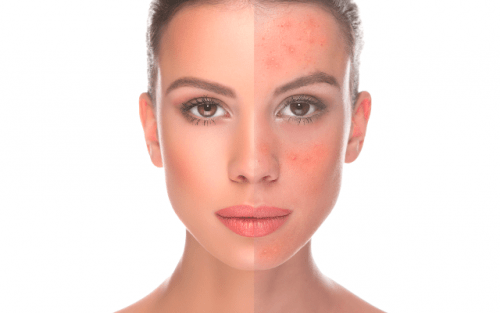Rosacea is a common chronic inflammatory skin condition that typically affects the facial skin, particularly the blood vessels and hair follicles. This condition causes the subcutaneous blood vessels to dilate and become congested, leading to redness and sensitivity.
This redness can be worsened by certain triggers such as hot weather, emotional stress, spicy foods, exercise, and alcohol consumption. Over time, the condition can cause the skin to thicken and the pores to become enlarged, leading to a condition called rhinophyma, also known as “bulbous nose.”
Unfortunately, rosacea is a long-term condition, and if left untreated, it can worsen over time. The condition progresses through different stages, starting with mild and subtle symptoms and progressing to more severe symptoms such as thickening of the skin on the nose. Early detection is key to preventing the condition from getting worse, and individuals should look out for early warning signs such as frequent facial redness and sensitivity, particularly after exposure to skin irritants.
Rosacea can also lead to eye problems such as blepharitis, conjunctivitis, keratitis, and uveitis. Symptoms include dryness, blurry vision, tearing, light sensitivity, and foreign body sensation. As a result of prolonged inflammation, the nose may also develop an enlarged appearance due to abnormal growth of connective tissue and sebaceous glands, forming nodules of various sizes.
Treatment for rosacea is available, and individuals should seek medical attention as soon as possible to avoid complications. Early treatment is crucial to preventing the condition from worsening and to alleviate symptoms. A dermatologist can diagnose the condition and develop a treatment plan tailored to each patient’s specific needs. In some cases, medications, such as antibiotics, can be prescribed to reduce inflammation and prevent worsening symptoms. Laser treatment is also a common treatment method, particularly for rhinophyma, to reduce the size of nodules and improve the appearance of the nose.
In summary, rosacea is a chronic inflammatory skin condition that can worsen over time if left untreated. Early detection and treatment are essential to preventing the condition from worsening and reducing symptoms. Seek medical attention from a dermatologist to develop a treatment plan tailored to your specific needs.

